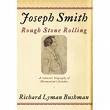Today I spoke in church. I also gave the lesson in the Elders quorum and set up a Eagle board of review.
Faith and Moving Mountains
President Hinckley spoke of the Faith to Move Mountains in his Sunday morning address last general conference. As I listened and later read his comments I was touched by the stories of faith. There were no tales of removed mountains. But there were, however, tales of saints enduring the trials of mortality because of their faith in Jesus Christ. And when they endured them well, the received their promised blessings. In some cases, prophets of the Lord overcame mountainous obstacles to further the kingdom of God. Faith in our savior makes it possible for us to do what may otherwise seem impossible.
Mormon quoted the Savior in Moroni 7:33 “If ye will have faith in me ye shall have power to do whatsoever thing is expedient in me.”
When I was very young, I thought that if I believed hard enough I could walk on water. My failure, and I assure you I did fail, I deduced was because my faith wasn't strong enough. I have since learned that Faith like every other principle of the gospel is built in steps. I can not have the faith to walk on water, move mountains, or raise the dead, until I first learn faith to serve a mission, pay my tithing, keep the fast, and do my home teaching. As we exercise our faith and do the things he has asked, his spirit will abide with us. In D&C 46:30 Joseph Smith taught that “He that asketh in the Spirit asketh according to the will of God; wherefore it is done even as he asketh.”
Faith vs Proof
I consider myself a man of faith. This is sometimes juxtaposed against being a man of science, as if the two were incompatable. But I have been educated as a man of science. I have studied Chemistry, Statistics, I have a Masters in Technology Management. Like many of you my education trained me to trust in only what can be proven. In my job I am often asked to provide such proof Recently I was asked “Will setting aside a hospital wing just for neurosurgery patients bring in more business?” “Prove it”, my boss says, “and then we'll decide whether to do it.” This is not the gospel pattern. Moroni teaches us in Ether 12:6 that we receive “no witness until after the trial of [our] faith.” Today, just as in ages past, there have been men who claim that they have proven that what we believe is false. This is the pattern. Without the opposition of doubt there can be no faith. We need faith because we do not know, because there is doubt. If we had no doubt, then we would know and we would no longer need faith. In Ether 3:19 we read how the Brother of Jared saw the finger of Jesus and “had faith no longer, for he knew, nothing doubting.”
As it has been since the gospel was revealed to Adam, the saints will be ridiculed for their beliefs. And we will not always know how to answer their scorn. But all the men of science have lost sight of what is truly being tested here. They see the existence of God and the validity of his church as being on trial. But it is not God who needs to prove himself to us. It is we who must prove ourselves to God. To this end he has set the pattern. In Abraham 3:25 the Lord says “And we will prove them herewith, to see if they will do all things whatsoever the Lord their God shall command them;”
Faith and Service
One of the things he has asked of us is to help those in need. President Hinckley spoke of the Willie and Martin handcart companies and the Hunt and Hodgett wagon companies which accompanied them. They had the faith to come to Zion. They endured privation to follow the Lords commandments. Their rescuers had the faith to drive their wagon away from their homes into the storms in which their fellow saints were caught. They did so with the faith that it was the right thing to do. The saints in Utah could have said. They brought this on themselves. They should not have left so late in the season. If they had faith they would have been warned to to go. There may have been some who thought this we don't know. We do know that Brigham Young taught otherwise. The Faithful contributed horses, wagons, food, supplies, and themselves to help those in need.
Brothers and sisters. What are we willing to do in faith?Are we miserly with our time, talents, and means. We are not all called to drive the wagons out to meet those stranded on the plains. We are called to do some part. Some donated flour, others horses, wagons, blankets. May we each have the faith to listen to the spirit of the Lord, to learn what he would have us do. And may we have the faith to do it.
Judy HarperAmen Brother!
Sunday November 12, 2006 - 08:41pm (PST)











